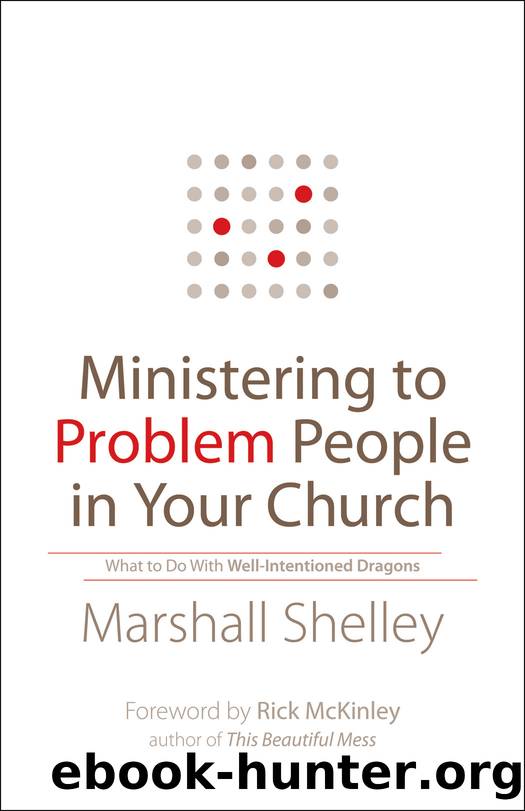Ministering to Problem People in Your Church by Marshall Shelley

Author:Marshall Shelley
Language: eng
Format: epub
Tags: REL109000, REL074000, REL050000
Publisher: Baker Publishing Group
Published: 2013-10-22T16:00:00+00:00
7
The Best Defense
You must live with people to know their problems, and live with God in order to solve them.
P. T. Forsyth
With the right spirit, a clumsy church structure will work. Without the right spirit, an ideal structure won’t work.
Malcolm Cronk
After looking at the diverse dragons that can threaten a church, what are the best defenses?
Landscapers know the best way to prevent weeds is not to attack them individually. Uprooting stubborn dandelions or chickweeds one by one will improve appearances temporarily, but within days, the troublesome plants will be back. The best way to handle weeds is a thick, healthy lawn, which keeps them from springing up in the first place.
Likewise pastors, who are charged to “see to it . . . that no bitter root grows up to cause trouble and defile many” (Hebrews 12:15), find that the best way to prevent dragon blight, or at least minimize its damage, is to concentrate on developing a healthy church.
Taking opportunities to build a close, cohesive church will produce better results than the shrewdest political maneuvers to squelch dissenters after problems sprout. Defusing potential problems before they arise is far better than troubleshooting later on.
What are the keys to dragon-proofing a church? Obviously no technique is 100-percent effective, but there are several principles pastors have found helpful in building church health.
Encourage a Positive Atmosphere
Some churches enjoy fighting. So do some pastors. Feisty, do-or-die leaders have a way of developing feisty churches.
Joseph Bayly, a savvy observer of church life, once wrote: “Fighters must fight. Generals and admirals are never so happy as when they are involved in a big or little war. Boxers are never so happy as when they are pounding opponents insensate. Battling pastors and battling churches are never so happy as when they are locked in combat, preferably with enemies without, but otherwise with each other.”
When attacked by church members, some pastors react by retaliating or at least refusing on principle to compromise. To bend would be a sign of weakness. It’s total victory, unconditional surrender—or perish gloriously in the attempt. Peacemaking, to them, is seen as compromise.
When relationships become adversarial, however, the pastor’s days are numbered. Most congregations are capable of producing more dragons than any one pastor can deal with. The best defense is to create an atmosphere that breeds mutual advocates, not adversaries.
How? Not by refusing to fight, necessarily—some important battles may have to be waged, although less frequently than most of us think. More often, the best way to build an atmosphere of cooperation is to model a positive tone personally:
by praising publicly the congregation’s strengths
by enjoying and taking pride in the diversity among church members
by thanking critics, at least initially, for their candor and concern
by assuming anything uncomplimentary you say about anyone will be repeated—because it probably will be—and by trusting very few people (your spouse? a colleague?) with your private criticisms and suspicions
by being slow to step into other people’s disagreements—balancing Paul’s instruction to carry, with some qualifications, each other’s burdens (Galatians 6:1–5) and Jesus’ refusal to intervene in the disputes of others (Luke 12:14).
Download
This site does not store any files on its server. We only index and link to content provided by other sites. Please contact the content providers to delete copyright contents if any and email us, we'll remove relevant links or contents immediately.
| Adult Ministry | Children's Ministry |
| Counseling & Recovery | Discipleship |
| Evangelism | Missions & Missionary Work |
| Preaching | Sermons |
| Youth Ministry |
The Rape Of Nanking by Iris Chang(2325)
The Secret Power of Speaking God's Word by Joyce Meyer(2253)
Chosen by God by R. C. Sproul(1760)
Crash the Chatterbox by Steven Furtick(1655)
Knowing God by J.I. Packer(1431)
Habits of Grace by David Mathis(1420)
How To Be Born Again by Billy Graham(1404)
A Prophet with Honor by William C. Martin(1373)
Peace with God by Billy Graham(1318)
God's Smuggler by Brother Andrew(1218)
Confronting Christianity by Rebecca McLaughlin(1193)
Whisper by Mark Batterson(1156)
Angel Dreams by Virtue Doreen Virtue Melissa(1140)
Missionaries by Norman Lewis(1135)
The Truth War by John MacArthur(1106)
The School of Biblical Evangelism by Ray Comfort(1100)
The Poems of Rowan Williams by Rowan Williams(1072)
Do Greater Things by Robby Dawkins(1046)
Eucharistic Miracles by Cruz Joan Carroll(1016)
